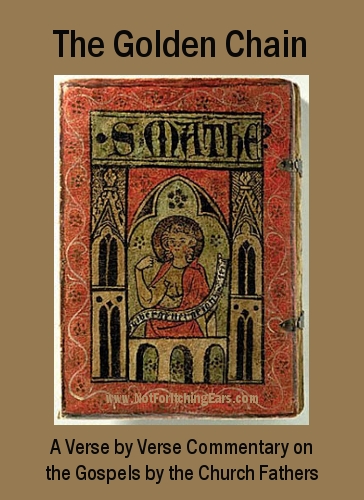Bible Study Resource Alert: Verse by Verse Commentary on the Gospels by The Early Church!
 The Catena Aurea (also called The Golden Chain) is a tremendous resource for any pastor or believer who desires to know how the early church understood scripture. It is a verse by verse commentary on the four Gospels by the church fathers that was compiled by Thomas Aquinas.
The Catena Aurea (also called The Golden Chain) is a tremendous resource for any pastor or believer who desires to know how the early church understood scripture. It is a verse by verse commentary on the four Gospels by the church fathers that was compiled by Thomas Aquinas.
For each of the four Gospel writers, the Catena Aurea starts by indicating the verses to be analyzed, then phrase-by-phrase, provides the early Fathers’ insights into the passage. It includes the work of over eighty Church Fathers.
The four volume set will cost you about $150, but thanks to Catechetics online, you can read these works for FREE!
Here is a sample of their commentary on John 3:16-19
16. For God so loved the world, that he gave his only begotten Son, that whosoever believes in him should not perish, but have everlasting life. 17. For God sent not his Son into the world to condemn the world; but that the world through him might be saved. 18. He that believes in him is not condemned: but he that believes not is condemned already, because he has not believed in the name of the only begotten Son of God.
CHRYS. Having said, Even so must the Son of man be lifted up, alluding to His death; lest His hearer should be cast down by His words, forming some human notion of Him, and thinking of His death as an evil, He corrects this by saying, that He who was given up to death was the Son of God, and that His death would be the source of life eternal; So God loved the world, that He gave His only begotten Son, that whosoever believes in Him should not perish, but have everlasting life; as if He said, Marvel not that I must be lifted up, that you may be saved: for so it seems good to the Father, who has so loved you, that He has given His Son to suffer for ungrateful and careless servants. The text, God so loved the world, shows intensity of love. For great indeed and infinite is the distance between the two. He who is without end, or beginning of existence, Infinite Greatness, loved those who were of earth and ashes, creatures laden with sins innumerable. And the act which springs from the love is equally indicative of its vastness. For God gave not a servant, or an Angel, or an Archangel, but His Son. Again, had He had many sons, and given one, this would have been a very great gift; but now He has given His Only Begotten Son.THEOPHYL As He said above, that the Son of man came down from heaven, not meaning that His flesh did come down from heaven, on account of the unity of person in Christ, attributing to man what belonged to God: so now conversely what belongs to man, he assigns to God the Word. The Son of God was impassible; but being one in respect of person with man who was passable, the Son is said to be given up to death, inasmuch as He truly suffered, not in His own nature, but in His own flesh. From this death follows an exceeding great and incomprehensible benefit: viz. that whosoever believes in Him should not perish, but have everlasting life. The Old Testament promised to those who obey obeyed it, length of days: the Gospel promises life eternal, and imperishable.
BEDE; Note here, that the same which he before said of the Son of man, lifted up on the cross, he repeats of the only begotten Son of God: viz. That whosoever believes in Him, &c. For the same our Maker and Redeemer, who was Son of God before the world was, was made at the end of the world the Son of man; so that He who by the power of His Godhead had created us to enjoy the happiness of an endless life, the same restored us to the life we have lost by taking our human frailty upon Him.
ALCUIN. Truly through the Son of God shall the world have life; for no other cause came He into the world, except to save the world. God sent not His Son into the world to condemn the world, but that the world through Him might be saved.
AUG. For why is He called the Savior of the world, but because He saves the world? The physician, so far as his will is concerned, heals the sick. If the sick despises or will not observe the directions of the physician, he destroys himself.
CHRYS. Because however He says this, slothful men in the multitude of their sins, and excess of carelessness, abuse God’s mercy, and say, There is no hell, no punishment; God remits us all our sins. But let us remember, that there are two advents of Christ; one past, the other to come. The former was, not to judge but to pardon us: the latter will be, not to pardon but to judge us. It is of the former that He says, I have not come to judge the world. Because He is merciful, instead of judgment, He grants an internal remission of all sins by baptism; and even after baptism opens to us the door of repentance, which had He not done all had been lost; for all have sinned, and come short of the glory of God. Afterwards, however, there follows something about the punishment of unbelievers, to warn us against flattering ourselves that we can sin with impunity. Of the unbeliever He says, ‘he is judged already.’ – But first He says, He that believes in Him is not judged. He who believes, He says, not who inquires. But what if his life be impure? Paul very strongly declares that such are not believers: They confess, he says, that they know God, but in works deny Him. That is to say, Such will not be judged for their belief, but will receive a heavy punishment for their works, though unbelief will not be charged against them.
ALCUIN. He who believes in Him, and cleaves to Him as a member to the head, will not be condemned.
AUG. What did you expect Him to say of him who believed not, except that he is condemned. Yet mark His words: He that believes not is condemned already. The Judgment has not appeared, but it is already given. For the Lord knows who are His; who are awaiting the crown, and who the fire.
CHRYS. Or the meaning is, that disbelief itself is the punishment of the impenitent: inasmuch as that is to be without light, and to be without light is of itself the greatest punishment. Or He is announcing what is to be. Though a murderer be not yet sentenced by the Judge, still his crime has already condemned him. In like manner he who believes not, is dead, even as Adam, on the day that he ate of the tree, died.
GREG. Or thus: In the last judgment some perish without being judged, of whom it is here said, He that believes not is condemned already. For the day of judgment does not try those who for unbelief are already banished from the sight of a discerning judge, are under sentence of damnation; but those, who retaining the profession of faith, have no works to show suitable to that profession. For those who have not kept even the sacraments of faith, do not even hear the curse of the Judge at the last trial. They have already, in the darkness of their unbelief, received their sentence, and are not thought worthy of being convicted by the rebuke of Him whom they had despised Again; For an earthly sovereign, in the government of his state, has a different rule of punishment, in the case of the disaffected subject, and the foreign rebel. In the former case he consults the civil law; but against the enemy he proceeds at once to war, and repays his malice with the punishment it deserves, without regard to law, inasmuch as he who never submitted to law, has no claim to suffer by the law.
ALCUIN. He then gives the reason why he who believes not is condemned, viz. because he believes not in the name of the only begotten Son of God. For in this name alone is there salvation. God has not many sons who can save; He by whom He saves is the Only Begotten.
AUG. Where then do we place baptized children? Amongst those who believe? This is acquired for them by the virtue of the Sacrament, and the pledges of the sponsors. And by this same rule we reckon those who are not baptized, among those who believe not.
Thanks to Catechetics online, you can read these works for FREE!
Posted on January 3, 2015, in Christianity, Early Church History and tagged Bible Commentary, Bible study resources, catena aurea, early church fathers, early church history, Eastern Orthodox, El cristianismo, faith, God, Gospel of John, Gospel of Luke, Gospel of Mark, Gospel of Matthew, inspiration, John 3:16, John 3:16-19, Not For itching Ears, Passion of the Christ, spirituality. Bookmark the permalink. 5 Comments.
















Thanks for the heads up Jim
Do you know if there is something like this for the epistles.
I know Thomas Oden has compiled a commentary set – Ancient Christian Commentary on Scripture – that captures this idea. But it is going to take awhile to collect it. 🙂
LikeLike
Cramer has an 8 volume set of the New Testament. However, it is in Greek! If your Greek is good, you can read the whole thing online here: https://archive.org/stream/catengrcorumpat02cramgoog#page/n12/mode/2up
LikeLike
Logos Software is also another option.
LikeLike
This IS a great resource. Thanks for sharing the link.
LikeLike
Pingback: Commonplace Holiness Blog